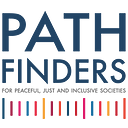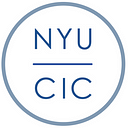SDG16+ CHAMPIONS OF CHANGE
The lawyer working with businesses to transform justice systems
Champions of Change is an initiative started by the Pathfinders to highlight advocates who have made an impact in their communities and have helped to create peaceful, just and inclusive societies (SDG16+). It provides an opportunity to feature individuals, businesses, and organizations doing extraordinary things to empower and inspire members of their communities.
Celia Ouellette is the founder and CEO of the Responsible Business Initiative for Justice (RBIJ), a non-profit that works with businesses to champion fairness and equality across systems of justice. Before starting RBIJ, she was a human rights lawyer, working to empower capital defense teams with the knowledge and skills to level the playing field in death penalty cases. She is an RSA Fellow, and in March 2020 she was made a Meaningful Business Ambassador, joining a global community of leaders working to achieve the UN Sustainable Development Goals.
We spoke with Celia Ouellette to learn more about her work and what drives her:
What ignited your pursuit for more peaceful, just, and inclusive societies?
I’m a human rights lawyer by experience, and over the years saw the staggering inequality and unfairness that exists within criminal justice systems. I spent the majority of my career working on death penalty cases, and while fighting these I realized that we needed to do more than just save people one by one — we had to fix the system.
I had worked with foreign governments to use trade and economic diplomacy to move the needle in capital cases, and from that model RBIJ was born — using the influence and power of businesses to deliver change.
To achieve a peaceful, just, and inclusive world, what does success look like to you? And what are the key factors in achieving this vision?
A world where our justice systems are designed to rehabilitate and help people, rather than to punish them for its own sake. A world where our systems of punishment and incarceration treats people as equals — in law and in practice — rather than further marginalizing already disadvantaged groups.
There are so many factors involved in achieving this, but it’s so important that we bring the glaring problems of our current system to light. These are things you can’t “unsee”.
Then it’s about showing people how they can create change — especially our most powerful and influential actors.
How does your work contribute to the SDG16+ goals?
RBIJ works with companies to champion fairness, equality and effectiveness across systems of punishment and incarceration.
We do this by educating them on justice issues, and then showing them how they can use their voices, operations and resources to create change. This could be anything from writing an Op-Ed in a newspaper about justice issues, to signing an open letter to a policymaker supporting reform, to adopting fair hiring policies.
In Ohio for example, we recently led a coalition of businesses to support a ban on the sentencing children to life sentences without the possibility of parole — which became law in January!
How has COVID-19 impacted your work? Are there any lessons learned from the pandemic that you hope to apply in future work?
At an issue level, the change has been enormous. The pandemic spread like wildfire through jails and prisons and turned minor sentences into death sentences — causing a reevaluation of who we are incarcerating and why. The devastation has also caused a real rethink of how our existing structures marginalize different groups — not least our justice system. On a fundamental level the systemic shock has allowed us to consider how we can rebuild a fairer and more equal world.
Operationally, so much of our work is network building and communications, and like so many organizations we had to rapidly pivot into an entirely virtual environment. However, in many ways this forced adaptation has allowed us to reach a much wider audience — especially with our events — and this focus is certainly something we will want to proactively take into our work going forward
What advice do you have for those seeking to make a difference for a more peaceful, just, and inclusive world?
Be open to collaboration everywhere — there are so many different factors and actors involved in this fight, and it’s going to take all of us to create meaningful, measurable and enduring change. Diverse partnerships can be invaluable.
Be proactive in getting proximate to the issues you are working on. It is only by actually talking to — and most importantly, listening to — justice impacted individuals that you will be able to fully understand the challenges they face. Then you can work to fix them.

